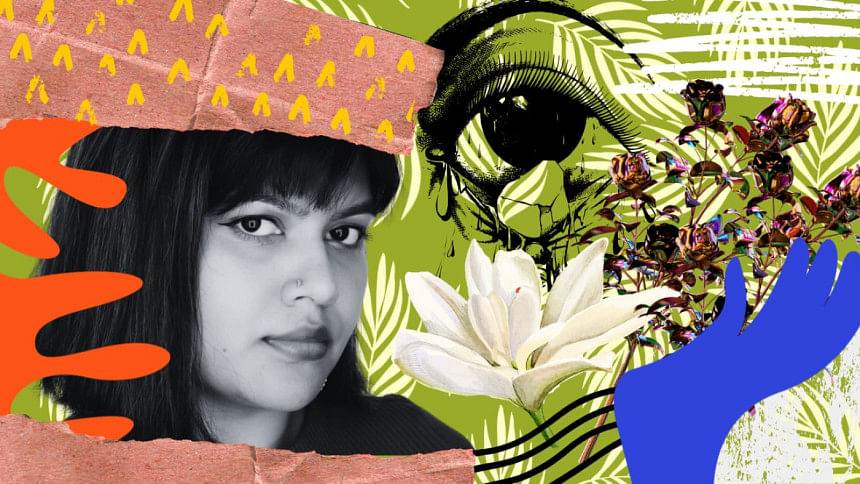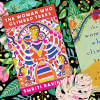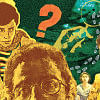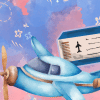Embracing the bizarre and ‘An Eye and a Leg’

The regional winner of the 2025 Commonwealth Short Story Prize, Faria Basher, in an interview with The Daily Star opens up about her journey from lifelong reader to emerging writer. She reflects on the creation of "An Eye and a Leg" (Granta, 2025), a surreal and darkly humorous story that challenges the cultural narrative of the "expiring woman." Through reflections on doubt, identity, and literary influences, she speaks candidly about embracing the bizarre, letting go of perfectionism, and the liberating power of writing on her own terms.
You mention being a longtime reader but a fairly new writer. Can you tell us where your love for books began, and what pushed you to finally start writing?
I've been an avid reader for as long as I can remember. I was a bit of a misunderstood child, but always found a lot of understanding in literature. I don't know if I can pinpoint a time or place my love for books began, per se; I think it's something that's just always been innate to me. My father has quite an inclination towards literature too, and is a published author in Bangladesh, so it's possible I inherited some of that from him.
Having that regular exposure to good literature definitely played a part in my journey to becoming a writer. I always knew that at some point in my life, I wanted to try my hand at writing, but I was held back by things like having not taken the academic route to writing, self-imposed perfectionism, and a touch of impostor syndrome. Writing became something I put on the back burner for many years. I kept saying to myself, "Not yet." I said the same thing to my wonderful friends that believed in me, even in times when I didn't. In retrospect, I don't regret the waiting too much, because I think things worked out for me exactly when they were supposed to. But I do regret the self-doubt.
I finally took the leap around the middle of 2024. I was living in New York at the time, which has such an amazing, thriving literary scene. I knew I wanted to take advantage of that while I was still in the city, so I began going to author events, poetry readings, and generally spending a lot of my time at libraries around the city. Having that contact with other like-minded young writers—as well as more experienced authors at the top of their craft—finally pushed me to create my own work. I was done waiting for the conditions to be perfect. "An Eye and a Leg" is one of the first stories I wrote to completion; I'm incredibly grateful for where it's taken me.
What led you to submit your story to the Commonwealth Short Story Prize, and what were your expectations going into it?
"An Eye and a Leg", though written with all the world's women in mind, takes place in a pan-South Asian context. This was vital to its overall moral and message. It is, by all accounts, a very cultural story. Before sending it out into the world, I knew that I wanted it to be assessed by an audience that would keep that cultural context in mind while reading. In that regard, the Commonwealth Short Story Prize was the ideal competition to send it in to.
I had very realistic expectations submitting to the competition; I'm like that with most things, really. I would have been very happy to receive any form of recognition for the story (and am overjoyed that I did). But even if I didn't, then I would have had an opportunity to create a solid piece of work regarding an issue that's important to me. There was nothing to lose here.
What has it meant to you to have your work recognised by the Commonwealth Foundation? Has this recognition influenced or added new energy to your writing journey?
I'm so eternally grateful to the Foundation for their recognition of my work. I've always had a bit of a unique way of looking at the world, which has often left me on the fringes of a wider collective. I knew while writing it that "An Eye and a Leg" was a weird one, that it might not be easily-understood or easily-liked. I wrote it anyway. So to ultimately receive that institutional validation—to know that the preliminary readers and judges resonated with my worldview and my surreal little story—is absolutely priceless.
In terms of my writing journey, making regional winner has definitely motivated me to keep my writing momentum going. I'd ideally like to avoid resting on my laurels. I want to keep reading, keep learning, and keep developing my writing capabilities.
In exploring the trope of the 'expiring woman', what personal insights or real-life observations informed your approach to this theme?
I think it's a universal experience, and especially in South Asia, for a woman to hit a certain age and be bombarded with subtle (and sometimes not-so-subtle) nudges towards marriage and starting a family. This commodification of women, the reduction of an individual down to her marriageability and childbearing capacity, always seemed to me like a great tragedy. It's dehumanising, and a great disservice to women's personal aspirations, talents, and liberties. I've always refused to internalise anything that contributes to my own oppression, but I'm in a personal and socioeconomic context where I'm able to do that. Many don't have that privilege. When I hit my mid-20s, I began to critically examine the idea of the "expiring woman" or the "old maid" trope that's so prevalent in various forms of media. Who wins by commodifying women and who wins when women begin systematically commodifying themselves? Who benefits when a woman races against the invisible clock in her head? My search for the answers to these questions led me to write "An Eye and a Leg".
How did you find the balance between dark comedy and the unsettling themes present in "An Eye and a Leg"? How important is humour to you when writing about heavy or uncomfortable topics?
I knew I had a message to get across in "An Eye and a Leg"—and I was never going to compromise on that. So keeping it intact, I gave myself the space to play around with elements of humour, surrealism, and a bit of body horror. I didn't want to write a regular, run-of-the-mill melodrama; the world has enough of those. What I did want was to shock my readers, make them laugh, cry, and ultimately have them reconsider everything they've been conditioned to believe in since birth. I wanted to write what no one has ever written before. Saras Manickam, Judge for the Asia Region, said that my story was "without hysterics, without playing to victimhood", which indicates to me I was successful in what I set out to do.
I believe all tragedies are, at their core, hilarious. The best tragic works of literature are ones that incorporate humour so cleverly that you can't even tell it's there. It's a tragedy when we quell women's ambitions and aspirations for the sake of marrying them off, but it's also hilarious, I think, in how we approach it. In the imaginary, socially-constructed timelines we assign them. I personally will always incorporate some humorous and outlandish elements in anything tragic I write; it's how I offset the seriousness of it.
Your piece, "An Eye and a Leg", has been described as a darkly humorous take on the idea of 'expiring' South Asian women. What works and authors would you say have influenced or inspired your writing?
Back in high school, in the 11th grade, I was assigned to read Woman at Point Zero by Nawal El Saadawi. Some books stay with you for life, and this is definitely one of them. It's one of the best pieces of feminist literature I've ever read. The more bizarre elements in "An Eye and a Leg" were inspired by works like Han Kang's The Vegetarian (Hogarth, 2016) and Sayaka Murata's Earthlings (Granta Books, 2018).
Is there anything you've learned early in your writing journey that you wish someone had told you sooner?
Occasionally, while writing "An Eye and a Leg", I thought too deeply into the ridiculousness of it. I began to question whether my story of a disintegrating woman held any actual merit, or was just heavy on the shock value and best left to myself. I took the risk, wrote and submitted it to the Commonwealth Short Story Prize anyway. I'm so glad it paid off, but I do sometimes wonder what would have happened if I'd given in to that apprehension.
I suppose what I'm saying is that I've learned to advocate for myself now, and to believe in the stories I tell (no matter how weird or off-kilter they may be). The best writing I've ever read has been from writers that constantly questioned things, that had unique, inimitable perspectives regarding the world and didn't borrow ideas from anybody else. I definitely wish someone had told me to hold that self-belief sooner.
Where do you hope your writing takes you, both literally and creatively, in the next few years?
As I mentioned, I'm eager to keep this momentum going, but at the same time, I'm going to pace myself. I'm not in any rush. I'm just the instrument through which my stories tell themselves. There's a few works in progress I'm looking forward to completing and submitting to various competitions and journals within the next year or so. After that, who's to say? All I'm certain of at the moment is that while I might have what it takes to be good, I'd very much like to become great.

 For all latest news, follow The Daily Star's Google News channel.
For all latest news, follow The Daily Star's Google News channel. 











Comments